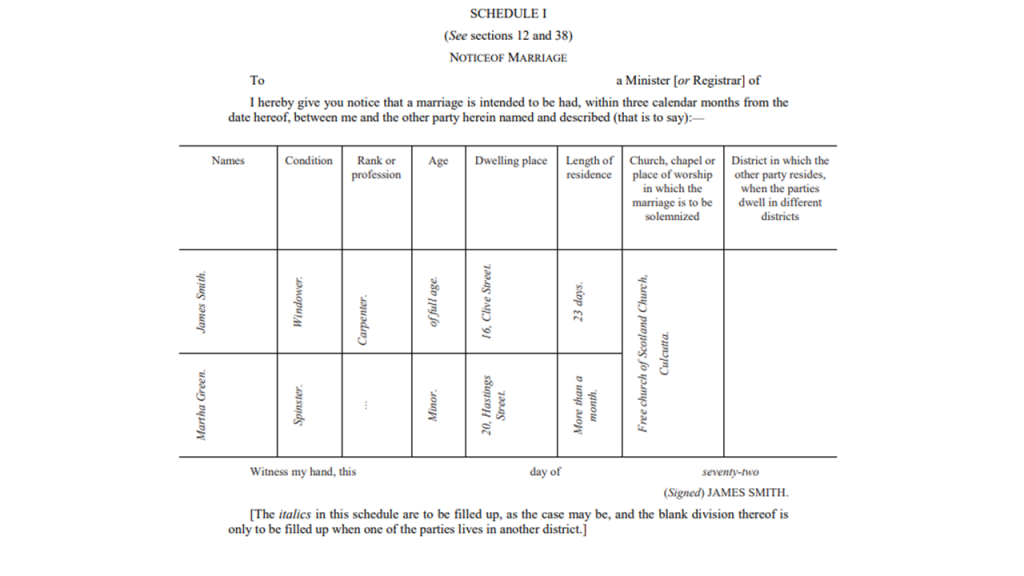A marriage performed by a licensed Minister of Religion is divided into 4 stages:
Stage 1: Issuing of Preliminary Notice
In case two persons wish to be married by a licensed Minister of Religion, one of them must give a notice in person to the Minister, stating their intention to be married. The notice should mention the following:
- The name and surname, and the profession or condition, of each of the persons intending marriage.
- The current address of each of them.
- The time during which each has been present in the said address. In case a person has been staying there for more than a month, they only need to state the same.
- The place of marriage – either a church or a private dwelling.
Given below is a sample notice:

The Minister will then paste the notice at a conspicuous or public place in the church. If the marriage is taking place at a private dwelling, the notice will be forwarded to the Marriage Registrar of that district, and the notice will be pasted in a conspicuous place of the Registrar’s office.(( Section 14, Indian Christian Marriage Act, 1872.)) In situations where the Minister refuses to perform a marriage, the notice will be either forwarded to another Minister, or returned to the persons who wish to get married.(( Section 15, Indian Christian Marriage Act, 1872.))
Stage 2: Issuing of certificate of receipt of notice
After at least four days of receiving the notice,(( Section 17, Indian Christian Marriage Act, 1872.)) one of the persons intending marriage must make a declaration to the Minister, stating that no legal problems exist in the marriage. In case one of the parties is a minor, they need to state that the necessary steps have been taken.(( Section 18, Indian Christian Marriage Act, 1872.)) To know more about the special procedures of marriage of a minor, read our explainer on Marriages of Minors under Christian Law.
Stage 3: Performance of Marriage
After such a declaration has been made, the Minister will issue a certificate and the Minister must conduct the marriage within two months of the couple getting the certificate.(( Section 17, 24-26, Indian Christian Marriage Act, 1872.)) Two witnesses must attend the marriage, apart from the Minister.(( Section 25, Indian Christian Marriage Act, 1872.)) In case two months have passed from receipt of the certificate, the entire process must restart with a fresh notice.(( Section 26, Indian Christian Marriage Act, 1872.))
Stage 4: Registration of Marriage
After the marriage is performed, the details of the marriage shall be entered in a register by the Minister.(( Part IV, Indian Christian Marriage Act, 1872. )) The entry will be signed by the Minister, parties to the marriage, and two witnesses who had attended the ceremony.(( Section 33, Indian Christian Marriage Act, 1872.))
A certified copy of an entry in the marriage register, signed by the person under whose custody the register is kept, will be legal evidence that the persons mentioned in the entry have been married according to the law.(( Section 80, Indian Christian Marriage Act, 1872.))
